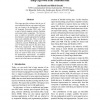Free Online Productivity Tools
i2Speak
i2Symbol
i2OCR
iTex2Img
iWeb2Print
iWeb2Shot
i2Type
iPdf2Split
iPdf2Merge
i2Bopomofo
i2Arabic
i2Style
i2Image
i2PDF
iLatex2Rtf
Sci2ools
ACL
2008
2008
Semi-Supervised Sequential Labeling and Segmentation Using Giga-Word Scale Unlabeled Data
This paper provides evidence that the use of more unlabeled data in semi-supervised learning can improve the performance of Natural Language Processing (NLP) tasks, such as part-of-speech tagging, syntactic chunking, and named entity recognition. We first propose a simple yet powerful semi-supervised discriminative model appropriate for handling large scale unlabeled data. Then, we describe experiments performed on widely used test collections, namely, PTB III data, CoNLL'00 and '03 shared task data for the above three NLP tasks, respectively. We incorporate up to 1G-words (one billion tokens) of unlabeled data, which is the largest amount of unlabeled data ever used for these tasks, to investigate the performance improvement. In addition, our results are superior to the best reported results for all of the above test collections.
ACL 2008 | Computational Linguistics | Scale Unlabeled Data | Semi-supervised Discriminative Model | Unlabeled Data |
| Added | 29 Oct 2010 |
| Updated | 29 Oct 2010 |
| Type | Conference |
| Year | 2008 |
| Where | ACL |
| Authors | Jun Suzuki, Hideki Isozaki |
Comments (0)

